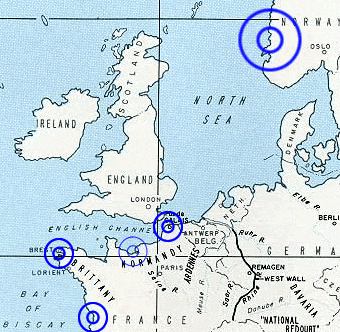Deception
The invasion of Normandy was a total surprise for almost all of the Nazi commanders.

This map shows the zones that the German high command considered the most probable for an invasion of Europe.
The Allied command succeeded in tricking the enemy, pretending that Operation Fortitude was in preparation, commanded by General Patton, aimed at liberating Norway.
The deception also based itself on the prestige of Patton. The Germans regarded him one of the best commanders on the field and considered that with his impetuousness he would certainly have participated in the initial phases of the invasion.
Fortitude consisted in corps, divisions, regiments and battalions stationed in the north of Great Britain and existed only on paper and in radio communications. Fake quarters, hangars, and every type of means were constructed to create a visual confirmation of the radio communications to the Germans. They come to believe what they are naturally induced to believe; the rigidity and the lack of democracy within the command structure did the rest, limiting and discouraging the discussion between the different levels of rank and of organization.
If in war it is possible to outline an operation of “Maskirovka” (Russian word that means “camouflage”), it is fundamental to determine if it has had success, especially when deception is the presupposition for an operation as vital as “Overlord.” The Allies could count on Ultra, a decoding system capable of deciphering the major part of German messages, which were exchanged with the system Enigma. Moreover, all the Nazi agents in Great Britain had been singled out and forced to collaborate. By these and other means, the Allies were able to deceive the enemy and to have a good degree of confidence in believing that the real operation would enjoy a surprise effect.
The Germans also believed that a landing on the European continent had to take place at Pas de Calais, the closest point between England and France. They were so convinced that the Allies would have landed on that point that for many of the initial hours of D-Day they continued to consider the landing in Normandy a diversion, organized to take away the attention from the true objective of the invasion.
As landing alternatives more plausible than Normandy, the port of Brest and the Bay of Biscay were considered.
Perhaps today these considerations seem absolutely and clearly mistaken if not ridiculous, considering that in 1942 the Allies had carried out a raid in Dieppe, which concluded with a disaster: that should have suggested to the Germans that the Allies would have difficultly attempted an assault on a fortified port like Brest. Moreover, an adversary searches with difficulty to strike where most obvious, crossing the English Channel to Pas de Calais. Finally, even if Norway was vital for Germany for its iron that supplied the war industry, and because there were situated the departure bases for the German submarines, it was not an objective as important for the Allies, not comparable to an invasion conducted directly toward the European continent.
The German command, from Hitler traveling down the chain of command down to the commanders on the field with few exceptions, tended to have to much faith in its own information and in its own past experience. In short it was too secure of itself. Despite that the impossibility of winning the war was evident to many, they were unwilling to abandon an attitude of superiority toward the enemy.
They would be deceived and defeated.